|
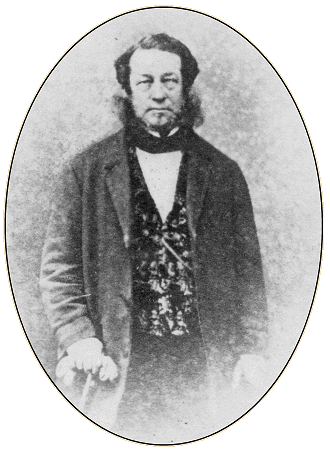
Charles Clark. |
T. & C. Clark & Company Limited,
based at Shakespeare Foundry, was founded in 1795 by
Thomas and Charles Clark, and grew to be one of the
largest iron foundries in Wolverhampton.
They were from an old Wolverhampton
family and became a large employer.
Charles Clark became mayor of
Wolverhampton in 1860 after being a member of the
Corporation since its formation as a municipal body.
He became a Councillor, Alderman,
and later Chief Magistrate. |

|
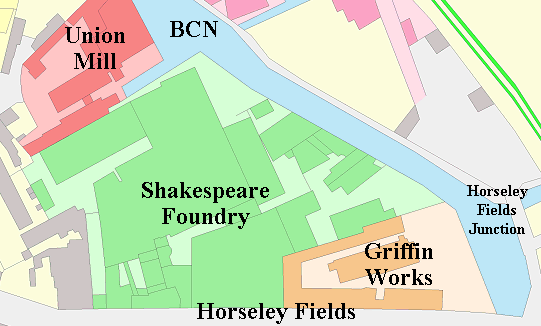
The location of Shakespeare
Foundry. |
| In about 1860, Charles Clark built Muchall Grove in
Penn, on part
of the Muchall Hall Estate, after the death of its
owner, William Thacker. |
|
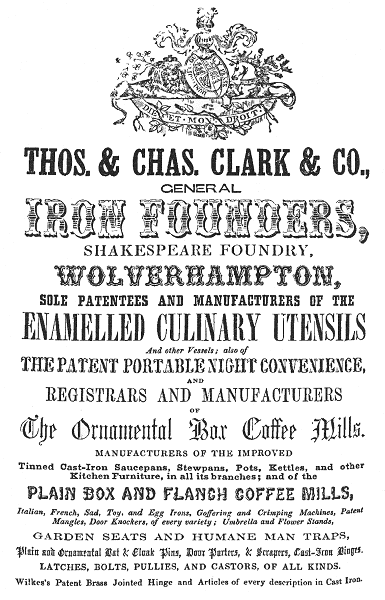
An advert from 1851. |
Charles is listed as living at
Upper Penn in Harrison, Harrod & Company's
1861 Directory and Gazetteer.
On the 29th January, 1863 he died. A diary found in a
deed box in St. Bart's Church has the following entry:
'This morning Mr. Charles Clark of Muchall Grove, J.P. and alderman of
Wolverhampton put a period to his existence in a fit of temporary
insanity; to the great grief of his family and sincere regret of his
friends.
As a sincere well wisher to the working classes, his loss will be
greatly felt in the district'. |
| In the 1870 edition of
J. G. Harrod & Company's postal and commercial
directory, Muchall Grove
is listed under Charles wife's name - Mrs. Mary Clark.
The company exhibited a number
of products at the International Exhibition of 1862
that was held from May to November, 1862 at South
Kensington, alongside the gardens of the Royal
Horticultural Society. The products on display
included the following: |
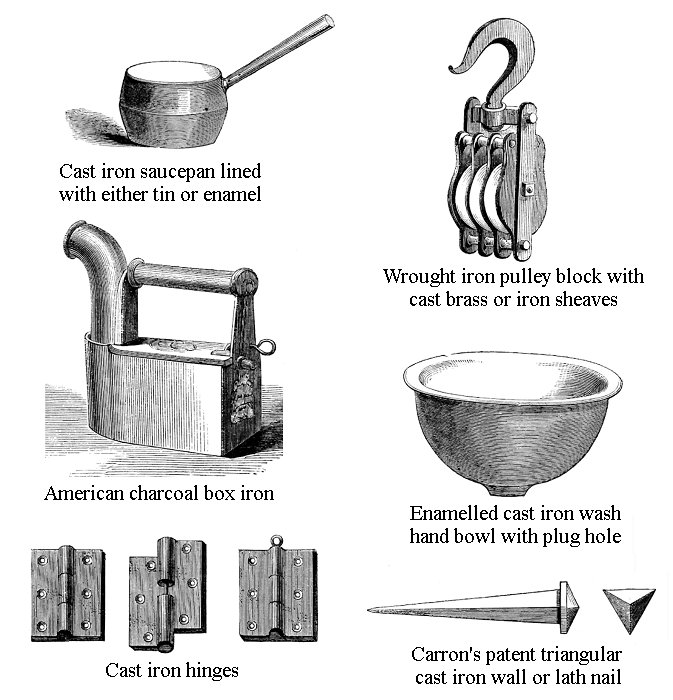
| In the 1881 census Charles Frederick Clark is listed
as an iron founder, employing between 600 and 700 hands.
His eldest son Thomas Charles Clark is listed as his
Clerk. |
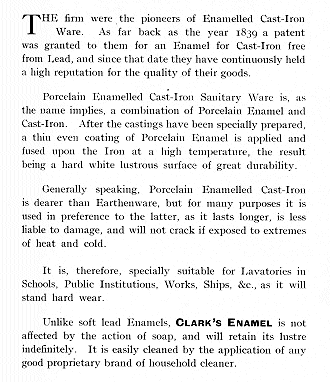
From the 1923 catalogue. |
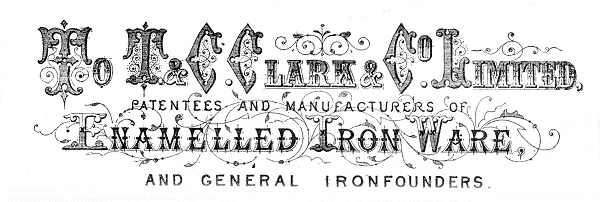
|
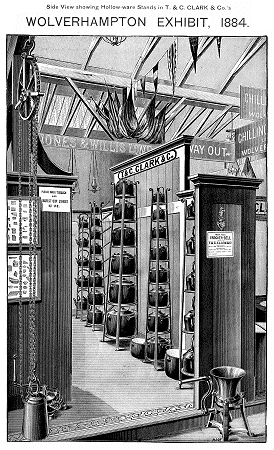
From the 1887 catalogue. |
The company was awarded the silver medal for its
products at the International Paris Exhibition in 1878.
The image opposite shows the company's stand at the 1884
Wolverhampton and Staffordshire Fine Arts and Industrial
Exhibition. |
|
The company's product range
included thousands of items, both domestic and
industrial. T. & C. Clark pioneered the
use of enamelled cast ironware, after taking out a
patent in 1839. It was guaranteed to be free of lead or
arsenic. The products included the following:
| axle pulleys, bath
fittings, camping equipment, chemical
furnaces, door fittings, dumbbells, hinges,
holloware of all descriptions, hooks,
latches, lavatory fittings, man traps,
mangles, mole traps, name and number plates,
paint mills, paper weights, pulley wheels,
sad irons, shovels, sinks, stable fittings,
tubular fencing, umbrella stands,
ventilators, wash basins, water taps,
weights, and window fasteners |
|
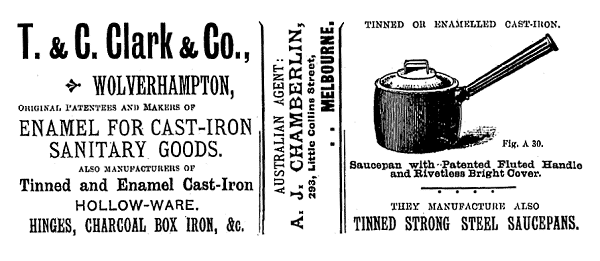
An advert from 1899.
| The Horseley Fields Gas Works was built on the
western side of Shakespeare Foundry. When it closed in
1900 the foundry was extended to cover the gas works
site. |
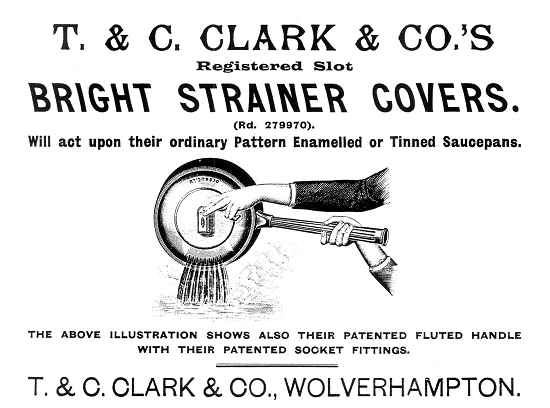
An advert from 1896.
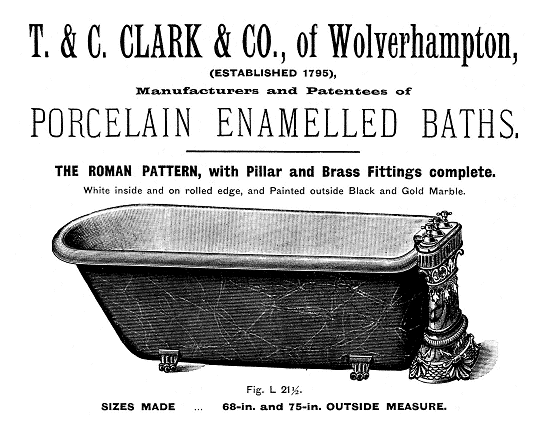
An advert from 1896.

| In the late 1940s and 1950s the company produced
acid-resisting enamelled cast iron boiling pans; steam
jacketed pans; stills; square and rectangular tanks;
open and closed mixing vessels; flanged pipes; bends and
tees; laboratory equipment; small scale plant;
evaporating bowls; beakers; sulphonators; and
glass-lined mild steel tanks for beer, mineral water,
and food. |
| View some of the company's
products |
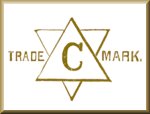 |

The derelict Shakespeare Foundry in the early
1970s. Courtesy of David Clare.
| The company is listed as enamelled chemical plant
manufacturers in Kellys 1962 Wolverhampton Directory,
but within a few years it had closed. |
 |
Return to the Canals
and Industry Menu |
|